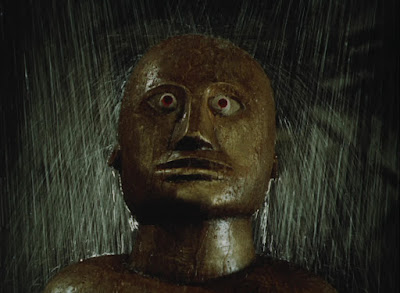It goes without saying Deaf Crocodile Films is my current
favorite boutique home video film releasing label in the marketplace. From their unveiling of two of Karen Shaknazarov’s
masterworks to three of Aleksandr Ptushko’s, the LA based outfit sponsored by
Vinegar Syndrome’s partner label emporium, Deaf Crocodile continues to be the
leader in introducing all things Eastern European cinema related whether it be Czechoslovakian,
Finnish, Polish, Romanian or Russian language.
Point being, they’re among the most dedicated curators and educators for
filmgoers in desperate need of a roadmap to travelogue all through Eastern
Europe’s indelible cinematic landmarks.
Among their latest special limited releases on their still
evolving, ever growing roster is Prague Nights: a kind of Czechoslovakian
horror anthology that switches freely between the modern and medieval, past and
present, real and/or imaginary. Split
between three directors Miloš Makovec, Jiří Brdečka and Evald Schorm, the film
was the baby of animator-screenwriter Brdečka and somehow or another was filmed
during the Soviet invasion of Prague in 1968, a detail you’d never know from
watching it. Long thought to be lost to
time, the anthological horror opus now restored by the Národní filmový archív
and released through Deaf Crocodile Films has a chance for rediscovery as
perhaps the most visually wild, iconographic Eastern European horror film since
Viy.
Our first one The
Last Golem is perhaps the most visually striking with its staggering vista
of a giant golden humanoid sculpture being constructed before finding the supernatural
will to walk on its own. The second one Bread
Slippers involves an 18th century countess living in luxury
flirting with sexy maids until a mysterious visitor absconds away with her to
an abandoned mansion with mercurial intentions.
Finally our last segment tying the wraparound narrative Poisoned
Poisoner together involves a murderess with a group of equally murderous
cronies in the Middle Ages beset to a poppy 1960s selection of Czech pop songs
provided by Zdenek Liska who also scored much of the film itself.
A hidden gem for fans of fantasy horror, the anthology wraparound
horror film ala Creepshow, Tales from the Darkside or even as far
back as Kwaidan is a delightful, visually ravishing horror odyssey
through modern and medieval Prague.
Between the three directors, the shifting styles of music, sound design
and eras being depicted, the multi-director package represents the unsung
height of the Czechoslovak New Wave or Film Miracle which seemed to push against
censorship while poking creative holes shedding light into what would otherwise
be a stale offering.
Spooky, atmospheric,
ambient and bordering on occult, the film’s centerpiece is inarguably The
Last Golem though it would be unfair to say the film diminishes thereafter
with Bread Slippers or Poisoned Poisoner. Like other Czech New Wave films before it including
but not limited to The Cassandra Cat or Daisies, there is a kind
of almost childishly playful streak running through the film from its
experimentation to its whimsical love for life despite dwelling in the macabre.
Sporting three cinematographers including Jan Kalis, Rudolf
Milic and Frantisek Uldrich, Prague Nights is visually stunning from top
to bottom. One of the key factors in the
film’s penetrating imagery involves the use of the black-and-white wraparound
narrative housing the stories before each segment dives into its own splash of
color. The result makes each story seem
larger than life and harkens back to the switching of color timing used on The
Wizard of Oz.
The aforementioned
composer Zdenek Liska alongside Jan Klusak offer up a score ranging from mod
60s hip jazz to medieval choral droning that feels channeled out of another
dimension, keeping listeners on their toes throughout. The ensemble cast is of course solid with
many of Czechoslovakia’s most renowned performers making the setlist with the
wraparound narrative housed on the shoulders of Milos Kopecký and Milena
Dvorská beautifully, though the real stars of this psychedelic horror show are
the film’s directors.
Again, filmed during the invasion of Prague which you’d
never know without looking it up, the film was difficult to see at all outside
of its country of origin. Effectively
the US blu-ray disc premiere, Deaf Crocodile’s deluxe limited-edition release
of Prague Nights represents an important contemporary inclusion into the
modern anthological horror sphere. At
once entrenched in the past and the present, the plausible and the
inexplicable, Mod sixties contrasted with medieval catacombs, it’s a distinctly
Czechoslovakian horror affair with unforgettable vistas and a unique spin on
the scary anthology movie.
A snapshot of
then-60s Prague and playfully spooky scare offering, Prague Nights is a splendid
horror anthology that could’ve only come from the Czech New Wave at a
tumultuous period in the country’s history, available for the first time to
North American consumers through arguably the best boutique releasing home
video label presently in practice.
--Andrew Kotwicki




